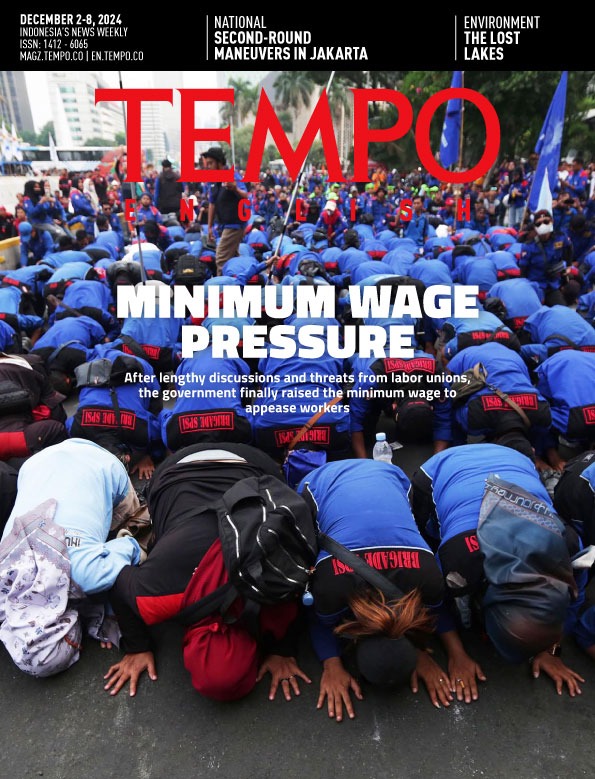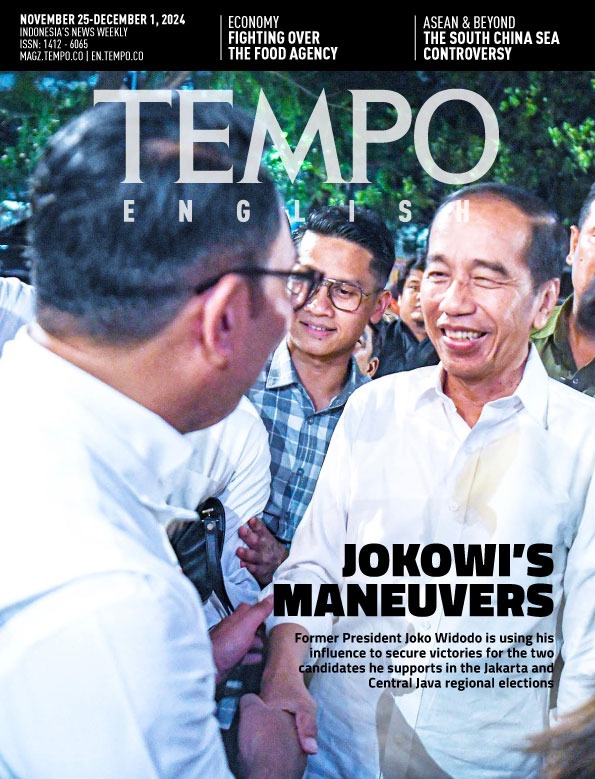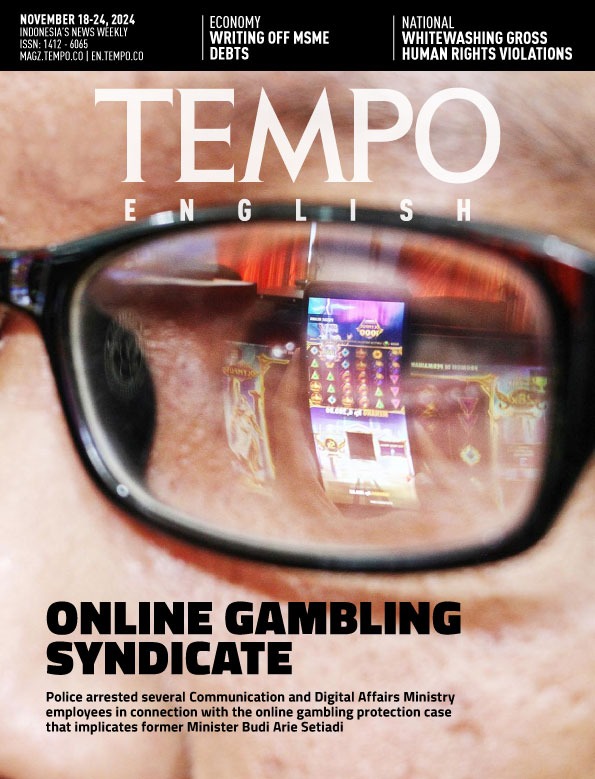November 11, 2014 edition
Cover Story
SRI Roso Sudarmo seemed to be really enjoying his retirement when Tempo visited him at his home one late afternoon last August. He was watering the lawn and the plants in front of his house in Sleman, a suburb of Yogyakarta. Clad in a T-shirt over a sarong, the 67-year-old former bureaucrat and army man, stood close to his Honda car, parked in front of the garage. His property, as big as a volley-ball court, was shaded by trees, giving an impression of coolness and serenity. "I know why Tempo has come all this way, it must be in the pursuit of news," said the former army colonel, greeting Tempo effusively.
For more than a decade, Sri Roso refused to be interviewed by the media regarding Udin, the journalist who was assassinated some years ago in Yogyakarta. Just prior to the interview, he even asked that we seek information from other sources. He relented only after he was convinced that his version of events was required to ensure a balanced report. "Let's not make it too long then, I must finish up watering the plants," he said. He then excused himself to change into a pair of trousers and shirt, combing his hair to look more presentable.
Read More
More Articles
Investigation
Raden Nuh, 45, wore a three-colored bracelet of woven thread around his wrist. It was a gift from Police Comr.Gen. (ret.) Noegroho Djajoesman, the former police chief for Metropolitan Jakarta from 1998 to 2000. "If I had worn this yesterday, the police would not have arrested me," Raden told Tempo last week. Noegroho who was interviewed just hours before, also wore a similar bracelet.
Tempo met Raden at the Jakarta Police Crime Investigation Unit, where he has been detained for the past week. He was arrested on November 2 at his boarding house in South Jakarta, not far from the offices of Asatunews.com, an online media he manages.
Read More
More Articles
Sidelines
One day in 1968 I visited Lempad, the genius artist, at his home in Ubud. He met me standing among the stone statues he had arranged haphazardly on the veranda. He was already around 100 years old then. Bare-chested, his wrinkled skin was clear to see. On his almost-bald head were tufts of thin white hair.
He showed me a bundle of pictures. And I was fascinated.
Read More
Interview
HAVING had to change jobs from being CEO of the state-owned railway company KIA, to transportation minister in the newly-formed cabinet of President Joko Widodo, Ignasius Jonan describes his new responsibilities through an interesting analogy. Whereas his worldview used to be from a train, for the next five years, he must view everything from a helicopter. "Each area has its own specific problem but the four dimensions of my new responsibilityland, sea, air and railwaymust get equal attention," said Jonan.
True to his word, for the required photo session, he refused to pose in front of anything that had the logo of a transportation company, not even with those depicting Indonesia's marine resources, so much flouted by the president as the country's new source of future prosperity. "Just take normal pictures," said Jonan leaning on a massive desk, adding that "I work in the dining pantry because this desk is too big."
Read More
Column
Manggi Habir*
Jokowi's presidency began with high expectations and promises of change. But the difficulty and subsequent delay of forming a cabinet of his choice and the need to compromise on certain positions was disappointing. However, facing his first tough test of raising domestic fuel prices to cut government subsidies, thus freeing funds for infrastructure and other development spending, his methodical approach so far is getting positive response. One problem is to adequately address the rise in food prices and general inflation that normally follows fuel price hikes in the past. It is this that cuts into the spending power of the poor.
According to Anton Hendranata, economist at Bank Danamon, the past fuel price hikes does not directly impact the poor, but it is the rising transportation costs that follow that translates into higher food prices that do. Indonesia's poor transportation infrastructure condition also adds to this cost. The long-term solution is to invest and improve the country's infrastructure, which will take time. But for the short-term, having sufficient food stock is critical to be able to flood the market whenever inflationary pressures arise.
Read More
Opinion
BUSINESS expansion uses business mechanisms, for example the acquisition of other companies or new investment. But the Lion Group has chosen a 'different road' in expanding its business.
The business group owned by National Awakening Party (PKB) Deputy Chairman Rusdi Kirana wants to try a new business: operating Halim Perdanakusuma Airport by 'edging out' Angkasa Pura II through legal means. The short-cut taken by Lion began with a Supreme Court ruling ordering Air Force-owned cooperative (Induk Koperasi Angkatan Udara or Inkopau) and airport operator Angkasa Pura II to leave Halim. The management of the commercial airport and Air Force base was then handed over to Angkasa Transportindo Selaras, a subsidiary of Lion and Inkopau.
Read More
More Articles
Indicator
SUSI Pudjiastuti has become a topic of intense debate. Born on January 15, 1965, the Susi Air founder's fame began when President Joko Widodo appointed her maritime affairs and fisheries minister. Many people have praised her abilities. But others have questioned her intellectual capabilities and personality, especially because she never finished high school. Almost everything about Susi has become a topic of discussion, from her style of dress to her habit of peppering her sentences with English to the stories of her life.
On Twitter, @EDDYSANTRI wrote, "It is true, Bu Susi is not a university graduate. But she is capable of creating job opportunities that allow her workers to educate their children and become graduates." But @ang_chun insisted that every minister have a university degree. "To work in a ministry, education and intellectual ability is absolutely necessary and Ibu Susi P does not have these qualities."
Read More
Letters
Eco Solution Clarifies
An article from Tempo's investigation in its November 3-9 issue sources PT Eco Solution Lombok (ESL). Tempo writes in the lead paragraph that "Thousands of hectares of prime tourism sites around West Nusa Tenggara, from the island of Lombok to neighboring Sumbawa, are occupied by foreigners. Conspiring with Indonesian notaries and authorities and masquerading as investors when they only intend to speculate, they take advantage of legal loopholes to skirt the law, which prohibits foreigners from owning land. They are even buying up protected forestland."
Read More
Outreach
During the corner-stone laying ceremony of the Bogor Institute of Agriculture (IPB) back in 1961, former President Sukarno requested that IPB produce as many agronomists and horticulturists as possible. "He knew the diversity of Indonesia's environment, and agronomists and plant breeders were needed everywhere in the country," said Muhamad Syukur, Professor of Agronomy and Horticulture at IPB.
According to Syukur, commodity plants would grow better if they were studied and treated so their genes could be improved to become better varieties. Tempo English reporter Syari Fani interviewed him two weeks ago on the problems faced when cultivating plants.
Read More
More Articles
National
THE JOY of the thanksgiving gathering that afternoon gave way to grief. Around 30 former members of a working group from President Joko Widodo's Transition Team questioned the role they might have in the new administration.
"Where will the volunteers be taken?" I Gusti Agung Putri Astrid Kartika said in Jakarta on Tuesday last week, recounting the meeting of a week earlier. "They want the post of director-general, agency head or whatever."
Read More
More Articles
Economy
Industries
Krakatau Steel Net Loses Rp1.4 Trillion in 3rd quarter
State-owned Krakatau Steel recorded a net loss of US$117.4 million in the third quarter of 2014. In the same period last year, it lost just US$10.9 million.
These heavier losses were mainly the result of a 13.3-percent drop in company revenue in the first nine months of the year, to US$1.36 billion. CEO Irvan Hakim said the decreased revenue was due to a 12-percent fall in steel sales in the local market and a 64 percent drop in the hotel and real-estate business.
Krakatau Steel Net Loses Rp1.4 Trillion in 3rd quarter












